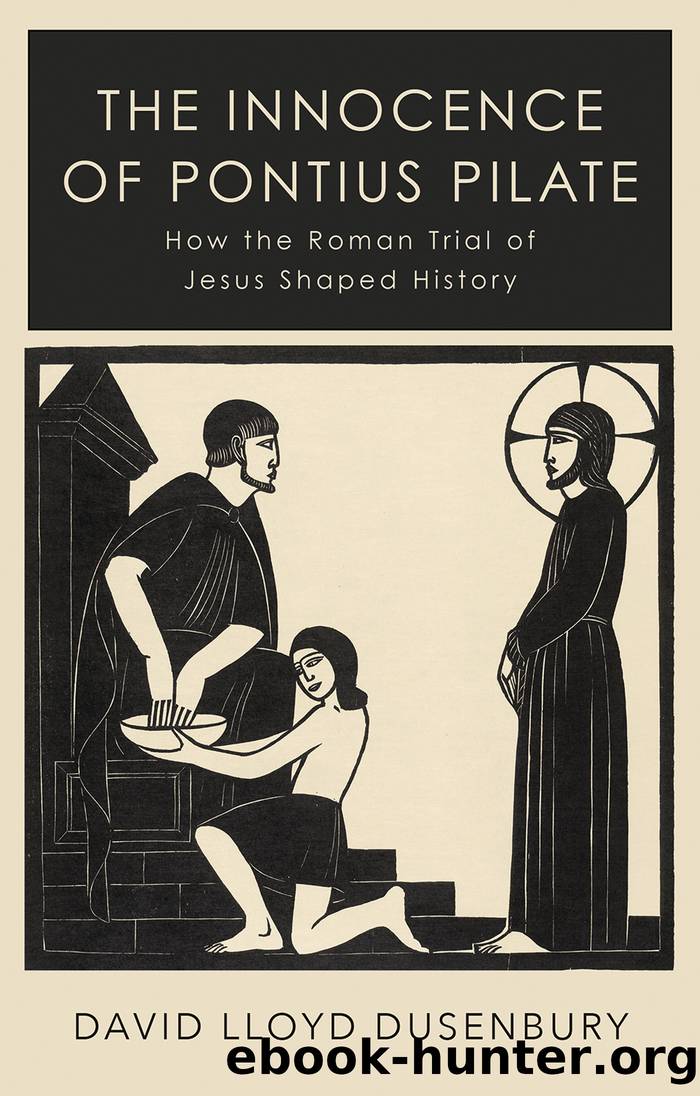The Innocence of Pontius Pilate by Dusenbury David Lloyd;

Author:Dusenbury, David Lloyd;
Language: eng
Format: epub
Publisher: Hurst Publishers
Published: 2021-06-15T00:00:00+00:00
âA king of truthâ
Hobbes uses the Johannine Pilate trial in a glaringly novel, that is, untraditional (or âhereticalâ) way, to argue that Jesus is in no sense a king in this world-age, and that the church is in no sense a kingdom in this world-age. The dubiousness of this reading is brought out when we recall that the arch-humanist and jurist Grotiusâwriting a couple of decades before Hobbesâsays that Jesus, in his reply to Pilate, claims to be âa king in a certain senseâ.28 Where Grotius holds that Jesus is a king, but not âin the vulgar senseâ,29 Hobbes shoots back that âthe vulgar senseâ is the only sense.
Pufendorfâs contribution to the tradition is exegetically and legally brilliant and deepens the modern logic of tolerance. According to Pufendorf, the sense in which Jesus is a king in this world-age is that he is âa King of Truthâ, and the sense in which the church is a kingdom in this world-age is that it is âa Kingdom of Truthâ.30 Contra Hobbes, Pufendorf believes that the rights of the churches to formulate or celebrate the Truth of Christ are not âdissolvedâ into the secular order, because, in Pufendorfâs unforgettable phrase: âTruth is not subject to human empire.â31
Situating truth and the question of truth outside the early modern stateâs jurisdiction suggestsâand Pufendorf sees thisâthat much error will fall outside the stateâs jurisdiction. And that is how Pufendorfâs theory of the church informs his theory of tolerance. Like philosophy, he says, Christianity can thrive in numerous jurisdictionsâeven hostile ones.32 This bare fact indicates, to Pufendorf, the limits of âhuman empireâ. Note the formulation: Pufendorf says that âtruth is not subject to human empireâ. It is of the essence of truth, he suggests, to be undecidable by means of human courts or edicts.
Pufendorf seems to voice a proto-romantic or a progressive convictionâfor him, it is merely Protestant and Christianâthat it is of the essence of truth âto be convincing in itselfâ.33 It is a divine right of truth, Pufendorf thinks, to convince and convictâeven bureaucrats, judges, and monarchs. Pilateâs jibe might be relevant, here: âWhat is truth?â34 But Pufendorf, unlike the seventeenth-century philosopher-Lord Chancellor Francis Bacon, does not read that as a joke.35 Which returns us to the Roman trial of Jesus.
Pufendorf offers his interpretation of the Pilate trial in a treatise he wrote at a time when, as he states in the first paragraphs of On the Bearing of Christian Religion on Civil Life, âsome of the greatest princes in Christendom (setting aside the ancient way of converting people by reason and force of arguments) have now recourse to open violenceâ, seeking to âforce their miserable subjects to a religionâ they cannot honestly confess.36 Confessional repression and coercion are not national problems in the late seventeenth century. They are European problems.
In this treatise, Pufendorf wants to âtrace the very original of religion in general, and of the Christian religion in particularâ, in the hopes of determining whether it is licit for any governmentâsacred or secularâto âcompel their subjects to obedience by force of arms, in matters of religionâ.
Download
This site does not store any files on its server. We only index and link to content provided by other sites. Please contact the content providers to delete copyright contents if any and email us, we'll remove relevant links or contents immediately.
| Church History | Historical Theology |
Fangirl by Rainbow Rowell(8788)
How to Bang a Billionaire by Alexis Hall(7937)
Wonder by R. J. Palacio(7745)
The Space Between by Michelle L. Teichman(6576)
The Thirst by Nesbo Jo(6442)
Assassin’s Fate by Robin Hobb(5856)
Wiseguy by Nicholas Pileggi(5320)
The Night Circus by Erin Morgenstern(5040)
The Kite Runner by Khaled Hosseini(4953)
Paper Towns by Green John(4801)
Bittersweet (True North #1) by Sarina Bowen(4719)
Gerald's Game by Stephen King(4377)
Too Much and Not the Mood by Durga Chew-Bose(4096)
Pillow Thoughts by Courtney Peppernell(4016)
Goodbye Paradise(3452)
Twelve Days of Christmas by Debbie Macomber(3415)
Good by S. Walden(3348)
The Rosie Effect by Graeme Simsion(3210)
The Cellar by Natasha Preston(3078)
